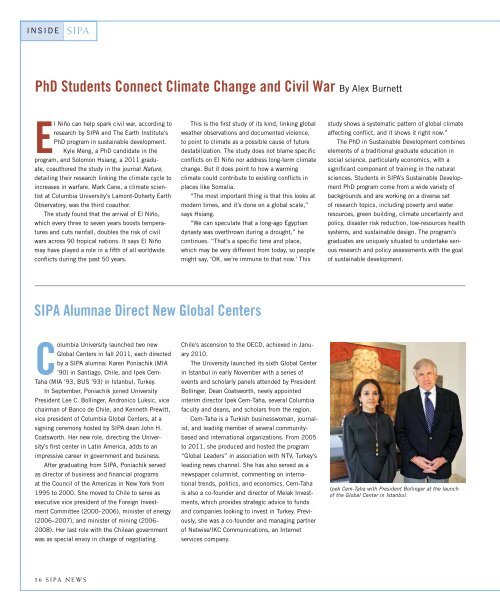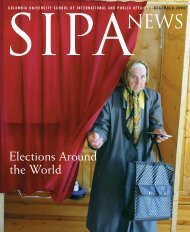SIPANewS - SIPA - Columbia University
SIPANewS - SIPA - Columbia University
SIPANewS - SIPA - Columbia University
Create successful ePaper yourself
Turn your PDF publications into a flip-book with our unique Google optimized e-Paper software.
INSIDE <strong>SIPA</strong><br />
PhD Students Connect Climate Change and Civil War By Alex Burnett<br />
El Niño can help spark civil war, according to<br />
research by <strong>SIPA</strong> and The Earth Institute’s<br />
PhD program in sustainable development.<br />
Kyle Meng, a PhD candidate in the<br />
program, and Solomon Hsiang, a 2011 graduate,<br />
coauthored the study in the journal Nature,<br />
detailing their research linking the climate cycle to<br />
increases in warfare. Mark Cane, a climate scientist<br />
at <strong>Columbia</strong> <strong>University</strong>’s Lamont-Doherty Earth<br />
Observatory, was the third coauthor.<br />
The study found that the arrival of El Niño,<br />
which every three to seven years boosts temperatures<br />
and cuts rainfall, doubles the risk of civil<br />
wars across 90 tropical nations. It says El Niño<br />
may have played a role in a fifth of all worldwide<br />
conflicts during the past 50 years.<br />
36 <strong>SIPA</strong> NEWS<br />
This is the first study of its kind, linking global<br />
weather observations and documented violence,<br />
to point to climate as a possible cause of future<br />
destabilization. The study does not blame specific<br />
conflicts on El Niño nor address long-term climate<br />
change. But it does point to how a warming<br />
climate could contribute to existing conflicts in<br />
places like Somalia.<br />
“The most important thing is that this looks at<br />
modern times, and it’s done on a global scale,”<br />
says Hsiang.<br />
“We can speculate that a long-ago Egyptian<br />
dynasty was overthrown during a drought,” he<br />
continues. “That’s a specific time and place,<br />
which may be very different from today, so people<br />
might say, ‘OK, we’re immune to that now.’ This<br />
<strong>SIPA</strong> Alumnae Direct New Global Centers<br />
<strong>Columbia</strong> <strong>University</strong> launched two new<br />
Global Centers in fall 2011, each directed<br />
by a <strong>SIPA</strong> alumna: Karen Poniachik (MIA<br />
’90) in Santiago, Chile, and Ipek Cem-<br />
Taha (MIA ’93, BUS ’93) in Istanbul, Turkey.<br />
In September, Poniachik joined <strong>University</strong><br />
President Lee C. Bollinger, Andronico Luksic, vice<br />
chairman of Banco de Chile, and Kenneth Prewitt,<br />
vice president of <strong>Columbia</strong> Global Centers, at a<br />
signing ceremony hosted by <strong>SIPA</strong> dean John H.<br />
Coatsworth. Her new role, directing the <strong>University</strong>’s<br />
first center in Latin America, adds to an<br />
impressive career in government and business.<br />
After graduating from <strong>SIPA</strong>, Poniachik served<br />
as director of business and financial programs<br />
at the Council of the Americas in New York from<br />
1995 to 2000. She moved to Chile to serve as<br />
executive vice president of the Foreign Investment<br />
Committee (2000–2006), minister of energy<br />
(2006–2007), and minister of mining (2006–<br />
2008). Her last role with the Chilean government<br />
was as special envoy in charge of negotiating<br />
Chile’s ascension to the OECD, achieved in January<br />
2010.<br />
The <strong>University</strong> launched its sixth Global Center<br />
in Istanbul in early November with a series of<br />
events and scholarly panels attended by President<br />
Bollinger, Dean Coatsworth, newly appointed<br />
interim director Ipek Cem-Taha, several <strong>Columbia</strong><br />
faculty and deans, and scholars from the region.<br />
Cem-Taha is a Turkish businesswoman, journalist,<br />
and leading member of several communitybased<br />
and international organizations. From 2005<br />
to 2011, she produced and hosted the program<br />
“Global Leaders” in association with NTV, Turkey’s<br />
leading news channel. She has also served as a<br />
newspaper columnist, commenting on international<br />
trends, politics, and economics. Cem-Taha<br />
is also a co-founder and director of Melak Investments,<br />
which provides strategic advice to funds<br />
and companies looking to invest in Turkey. Previously,<br />
she was a co-founder and managing partner<br />
of Netwise/IKC Communications, an Internet<br />
services company.<br />
study shows a systematic pattern of global climate<br />
affecting conflict, and it shows it right now.”<br />
The PhD in Sustainable Development combines<br />
elements of a traditional graduate education in<br />
social science, particularly economics, with a<br />
significant component of training in the natural<br />
sciences. Students in <strong>SIPA</strong>’s Sustainable Development<br />
PhD program come from a wide variety of<br />
backgrounds and are working on a diverse set<br />
of research topics, including poverty and water<br />
resources, green building, climate uncertainty and<br />
policy, disaster risk reduction, low-resources health<br />
systems, and sustainable design. The program’s<br />
graduates are uniquely situated to undertake serious<br />
research and policy assessments with the goal<br />
of sustainable development.<br />
Ipek Cem-Taha with President Bollinger at the launch<br />
of the Global Center in Istanbul.

















